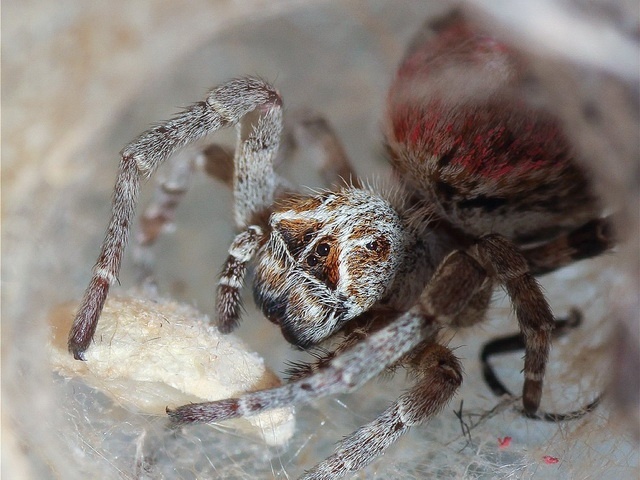Spiderlings consume their aunts as well as their mothers
Females of the social spider Stegodyphus dumicola behave altruistically: not only mothers, but also virgin females show suicidal maternal care and are consumed by the spiderlings, Anja Junghanns and colleagues report.
The South-African spider Stegodyphus dumicola lives in large groups. Females construct a communal nest of silk and plant material with capture webs attached, collaborate in nest defence and share their prey. But when it comes to reproduction, tasks are divided: less than half of the females will mate and get offspring.
It was already known that the mothers take care of their young; they construct an egg sac, tend and guard it for a couple of weeks and when the young spiders have hatched, they regurgitate food for them. Eventually, they are even consumed by their offspring. Anja Junghanns and colleagues asked whether virgin females contribute to brood care, and to what extent. They composed groups of mated females and virgins, marked them with different colours and observed their behaviour.
Risky job
The virgins do perform maternal tasks, they noticed. Like the mothers, they guard the eggs, be it less intensive; instead, they engage more in prey capture than mothers, which can be a risky job. When the spiderlings have hatched, the unmated females, just like the genetic mothers, perform extreme care, regurgitating food – and being consumed eventually.
That willingness to perform ‘suicidal care’ for the young of other females can be explained by the high genetic relatedness among group members. A group mostly starts with a single mated female. Her offspring stay around and mate and reproduce within the nest, resulting in extreme inbreeding; sometimes a small group splits off. A group can grow to a size of more than a thousand members. By helping to care for other females’ offspring, virgin females enhance growth and survival of the spiderlings. Because of the high relatedness, the virgins that provide such help gain almost as much reproductive success as when they would have produced young themselves.
Moreover, they have no better option. The males of a generation mature and die early after hatching, while females mature asynchronously and many are slow. Mature males mate with females that have grown as fast as males, and for the many females that are late, no males are left and they remain unmated. So, the virgins have nothing to lose by helping.
Willy van Strien
Photo: Female with egg sac. ©Anja Junghanns
Source:
Junghanns, A., C. Holm, M. F. Schou, A.B. Sørensen, G. Uhl & T. Bilde, 2017. Extreme allomaternal care and unequal task participation by unmated females in a cooperatively breeding spider. Animal Behaviour 132: 101-107. Doi: 10.1016/j.anbehav.2017.08.006
